人教版初二下学期现在完成时专题讲解与训练课件(36张PPT)
文档属性
| 名称 | 人教版初二下学期现在完成时专题讲解与训练课件(36张PPT) |  | |
| 格式 | pptx | ||
| 文件大小 | 7.3MB | ||
| 资源类型 | 试卷 | ||
| 版本资源 | 人教新目标(Go for it)版 | ||
| 科目 | 英语 | ||
| 更新时间 | 2020-07-05 09:08:21 | ||
图片预览



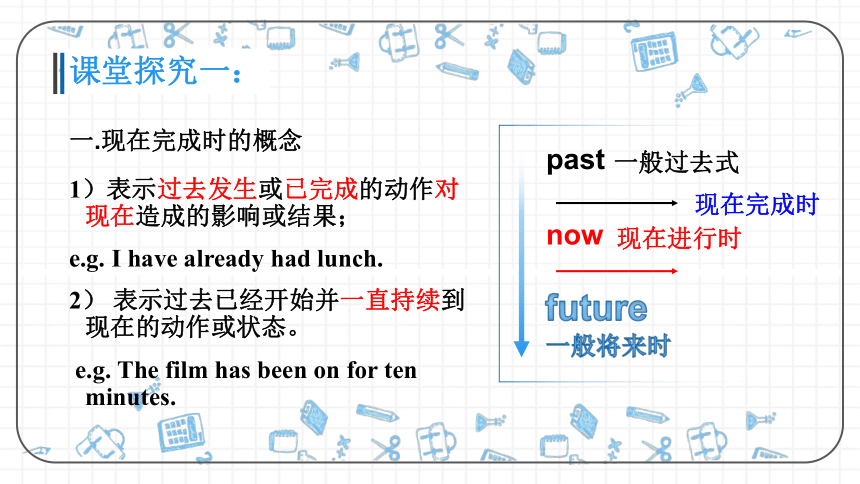
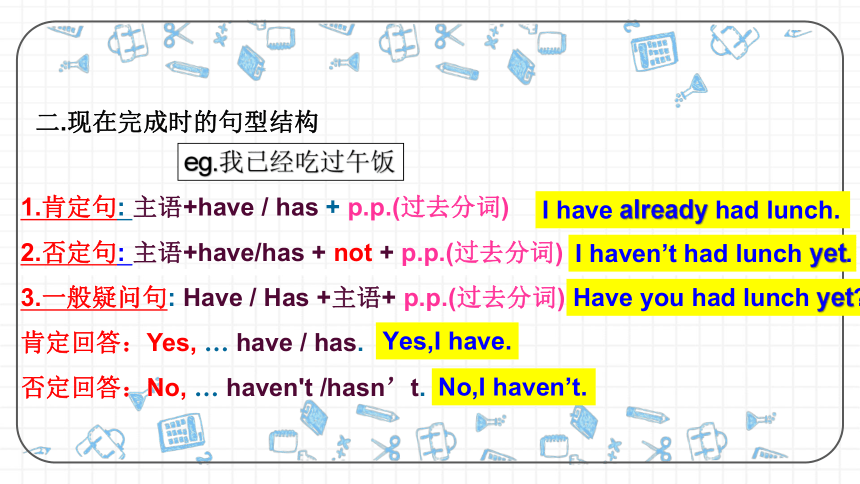
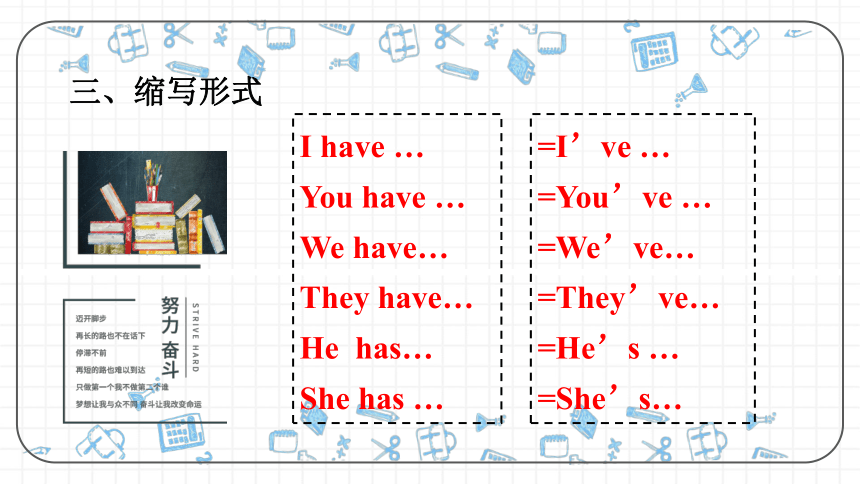
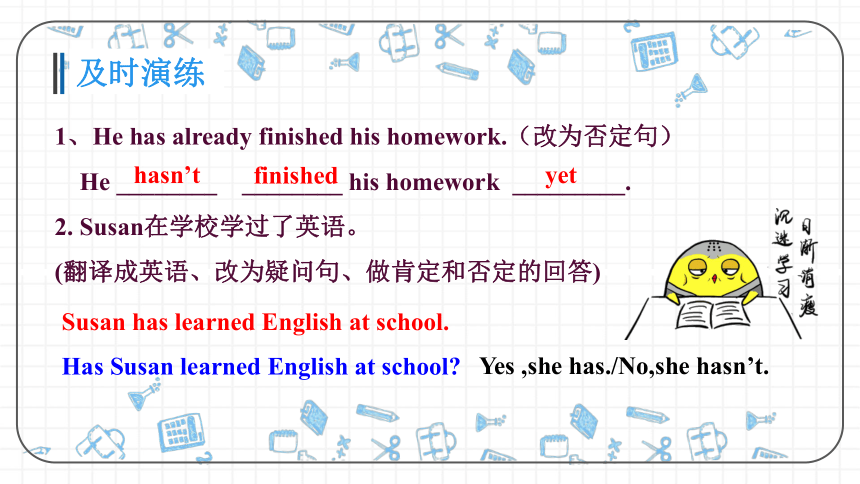
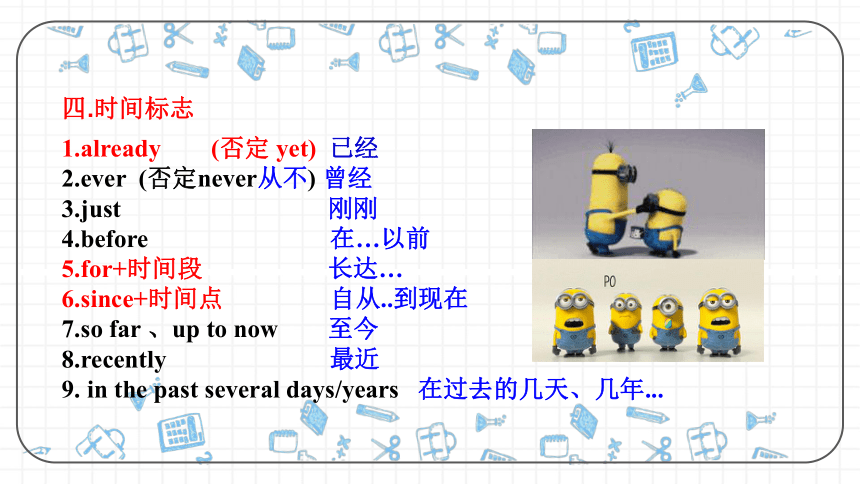
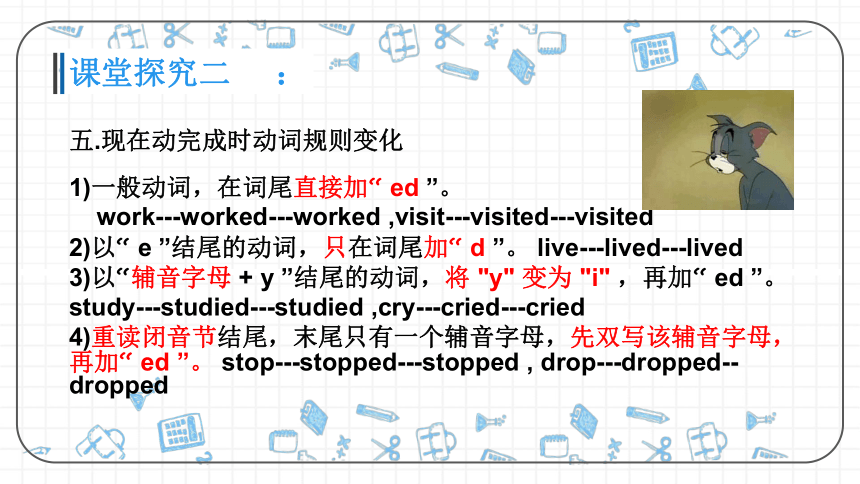
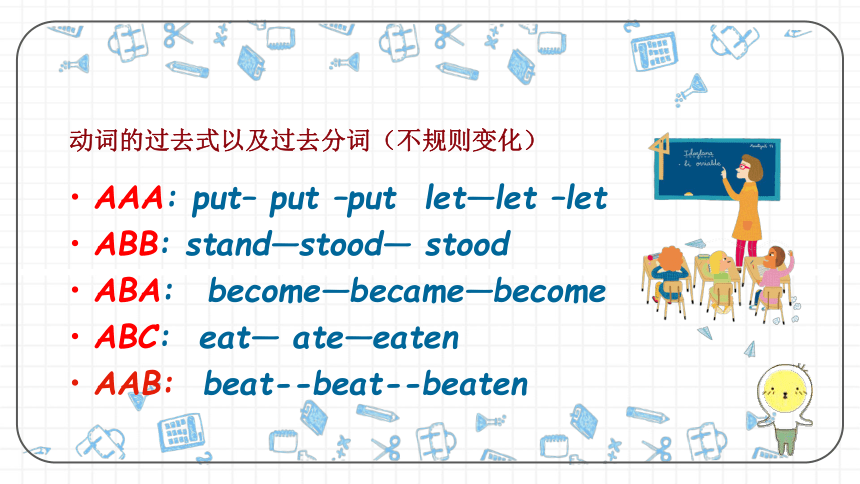
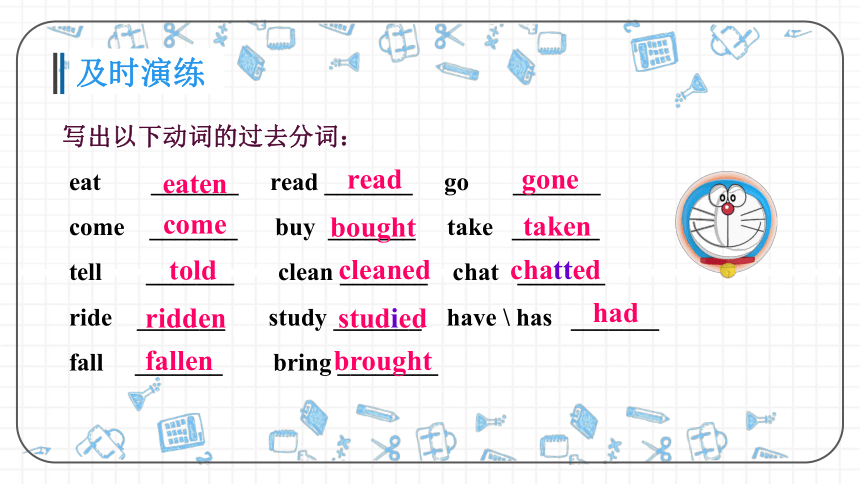
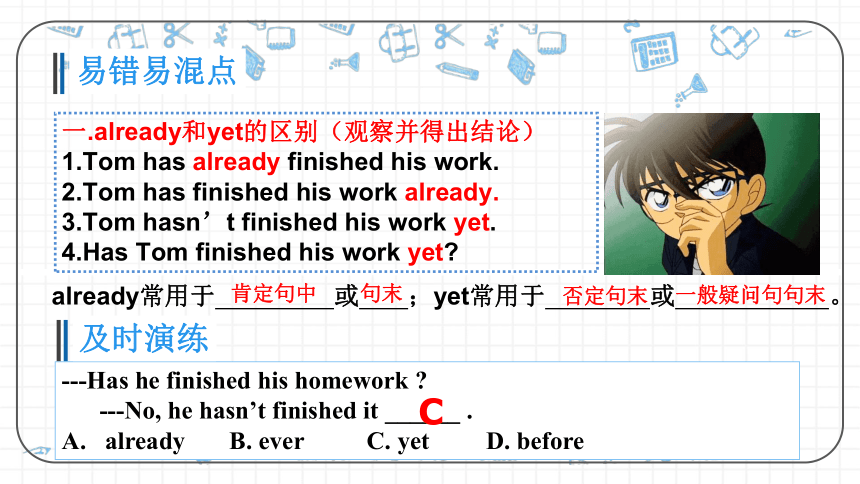
文档简介
Revision of the Present Perfect Tense
学习目标
学习并掌握现在完成时态的概念、结构、否定、疑问形式
1
掌握现在完成时态时与一般过去时的区别
2
学会并运用现在完成时
3
Lead in
冬天来了,春天还会远吗?
If winter has already come,
can spring be far behind?
课堂探究一:
一.现在完成时的概念
1)表示过去发生或已完成的动作对现在造成的影响或结果;
e.g. I have already had lunch.
2) 表示过去已经开始并一直持续到现在的动作或状态。
e.g. The film has been on for ten minutes.
past
now
future
现在完成时
一般过去式
现在进行时
一般将来时
二.现在完成时的句型结构
1.肯定句: 主语+have / has + p.p.(过去分词)
2.否定句: 主语+have/has + not + p.p.(过去分词)
3.一般疑问句: Have / Has +主语+ p.p.(过去分词)
肯定回答:Yes, … have / has.
否定回答:No, … haven't /hasn’t.
I haven’t had lunch yet.
Have you had lunch yet?
Yes,I have.
No,I haven’t.
I have already had lunch.
eg.我已经吃过午饭
三、缩写形式
I have …
You have …
We have…
They have…
He has…
She has …
=I’ve …
=You’ve …
=We’ve…
=They’ve…
=He’s …
=She’s…
及时演练
1、He has already finished his homework.(改为否定句)
He ________ ________ his homework _________.
2. Susan在学校学过了英语。
(翻译成英语、改为疑问句、做肯定和否定的回答)
hasn’t
finished
yet
Has Susan learned English at school?
Yes ,she has./No,she hasn’t.
Susan has learned English at school.
四.时间标志
1.already (否定 yet) 已经
2.ever (否定never从不) 曾经
3.just 刚刚
4.before 在…以前
5.for+时间段 长达…
6.since+时间点 自从..到现在
7.so far 、up to now 至今
8.recently 最近
9. in the past several days/years 在过去的几天、几年...
课堂探究二 :
五.现在动完成时动词规则变化
1)一般动词,在词尾直接加“ ed ”。
work---worked---worked ,visit---visited---visited
2)以“ e ”结尾的动词,只在词尾加“ d ”。 live---lived---lived
3)以“辅音字母 + y ”结尾的动词,将 "y" 变为 "i" ,再加“ ed ”。
study---studied---studied ,cry---cried---cried
4)重读闭音节结尾,末尾只有一个辅音字母,先双写该辅音字母,再加“ ed ”。 stop---stopped---stopped , drop---dropped--dropped
动词的过去式以及过去分词(不规则变化)
AAA: put– put –put let—let –let
ABB: stand—stood— stood
ABA: become—became—become
ABC: eat— ate—eaten
AAB: beat--beat--beaten
及时演练
写出以下动词的过去分词:
eat _______ read _______ go _______
come _______ buy _______ take _______
tell _______ clean _______ chat _______
ride _______ study _______ have \ has _______
fall _______ bring ________
eaten
read
bought
taken
told
cleaned
chatted
ridden
had
studied
fallen
brought
gone
come
易错易混点
一.already和yet的区别(观察并得出结论)
1.Tom?has?already?finished?his?work.
2.Tom has finished his work already.
3.Tom?hasn’t?finished?his?work?yet.
4.Has Tom finished his work yet?
already常用于 或 ;yet常用于 或 。
肯定句中
句末
一般疑问句句末
否定句末
---Has he finished his homework ?
---No, he hasn’t finished it ______ .
A. already B. ever C. yet D. before
及时演练
C
易错易混点
二.for和since的运用(观察并得出结论)
1.He?has?stayed?here?for?3?hours.
3.He?has?stayed?here?since?3?o’clock.
2.He?has?stayed?here?since?3?hours?ago.
4.He?has?taught?English?since?he?came?here.
for . for+ .
since . since+ .
since+ + . since+ .
经历…
自从…?以来
时间段
时间点
时间段
ago
一般过去时的句子
及时演练
选用for和since填空:
1.We haven’t seen each other ______ a long time.
2.His father has been in the factory ______ 10 years ago.
3.The film has been on ______ 20 minutes.
4.Mr Green has worked here ______ he came to China.
5.His grandparents have been dead ______ several years.
6. It’s five years _______ we met last time
for
since
for
since
for
since
三:have been to, have been in, have gone to 的区别
1、have (has) been in
表示“在某地(多长时间)”,现在仍在那里。
常与表示一段时间的状语连用。
e.g.你们来红领巾已经有两年了
You have been in Honglingjin for 2 years.
2、have( has)been to
表示“曾经去过某地”,现在已经不在那里了。
e.g.玛丽去过长城。
have (has) been to +次数,表示去过某地几次
e.g.他们去过北京3次了。
Mary has been to the Great Wall.
They have been to Beijing three times.
3、have (has) gone to
“到某地去了”,表示到了某地或正在去某地的途中。总之,说话时该人不在现场,
e.g.----Where is Tom?
----He has gone to the bookshop. 他到书店去了。
及时演练
用have been to、have been in、have gone to填空
My parents _______________ the Great Wall twice.
- ________you ever_________Xiamen?
3.How long ______ Peter _________the park?
4.My sister _____________ the shop. She will be back in two hours.
5.She _____________ Shanghai. She isn’t here.
6.She _____________ Shanghai for two years.
has gone to
have been to
Have
been to
has
been in
has gone to
has been in
四:短暂性动词与现在完成时
短暂性动词在肯定句、疑问句中不能与表示时间段的短语连用。
这些动词是: buy , borrow ,become, begin, arrive, come, die, fall, finish, get to know, go, join, leave, marry等。
为了表述相同的意思,我们常用相应的延续性动词have,keep等来代替短暂性动词。
I bought the cellphone 3 years ago.
e.g.我买这个手机有三年了。
I have had the cellphone for 3 years .
现在完成时分为两种情况:
1.强调过去发生的,对现在有影响,那么可以用短暂性v.
I have bought a pen.
She has come back from the school.
2.强调过去的动作持续到现在,并有可能继续下去,后面
有时间段,那么短暂性v要该改为持续性v
I have had a pen for a long time.
She has been back from school for two minutes.
短暂性动词与延续性动词的转换
come/go — be (in) leave — be away (from) borrow — keep
buy — have die — be dead get to know — know
begin — be on go out — be off go out — be off
arrive — be here/there marry/get married — be married
catch a cold — have a cold fall asleep/get to sleep — be asleep
join— be in the /be a member of+组织
及时演练
判断下列句子对错并将错误改正。
他的爷爷已经去世2年了。
Nick 参军3年了.
他离开深圳好长时间了。
4. 这本书我已借了4个月了.
His grandpa has died for 2 years.
Nick has joined the army for 3 years.
He has left Shenzhen for along time.
I have borrowed the book for 4 months.
X
X
X
X
has been dead
has been a member
has been away
have kept
过关
及时演练
一、将下列选项中错误的一处选出并改正。
1.I have borrowed the book for 2 weeks. ( )
A B C
2.The film has begun for 5 minutes. ( )
A B C
B kept
B been on
二、句子转换
3. 这辆自行车我买了两年了。I’ve _____ the bike _____ two years.
4. He left Nanjing two years ago.(改为同义句)
He _____ _____ _____ _____ Nanjing for two years.
5. The monkey died last month.The monkey(改为同义句)
_____ _____ _____ for a month.
had for
has been away from
has been dead
课堂探究三 4’
现在完成时与一般过去时的区别
现在完成时表示过去的动作一直延续到现在,甚至会继续下去,或表示过去的动作对现在造成的影响;
一般过去时表示动作发生的时间在过去。
现在完成时属于现在时态范围,因此,不能和表示过去的时间状语连用。 如:yesterday, last night, two weeks ago等 。牢记: when 不与现在完成时连用。
e.g. I have seen the film. e.g. I saw the film last week.
e.g. He has lived here since 1993. e.g. He lived here in 1993.
Summary 1’
自信检测 15’
一、单项选择 6’ (必做题)
1.So far ,we ____ 200 English words .
have copyed B.have copied C.copyed D.copied
2. ---Where’s your father ? ----He’s_____ Beijing?
been to B. gone to C. gone in D. been in
3. A number of the students _______ the film yesterday .
see B. saw C. seen D.have seen
4. How long _____ he ______ in this factory ?
has, come B. have, come C. has, been D. have,been
5. He’s never been to China, _______ ?
has he B. hasn’t he C. isn’t he D. is he
6. My grandma ______ in this village for ten years ,she _____ there in 1994.
A.has lived,has moved B. has lived, moved
C.lived, has moved D. lived, moved
7. How long has the girl’s mother ______?
A.died B. dead C. been died D. been dead
8. How many words have you learned _______ you began to learn English ?
A.for B. if C. before D. since
9. _____ have you been a member of Greener China ?
A.How often B. How long
C. When D. How far
10. ---Has he finished his homework ?---No, he hasn’t finished it ______ .
A. already B. ever C. yet D. before
二、用所给动词的适当形式填空 3’(必做题)
The Smiths ______________(watch) TV this time yesterday .
She ____________(make) a lot of friends here so far.
Her parents _____________(not write) to her since they left.
It is five years since he _________(join) the Party.
They _______(live) in this city ten years ago.
He ______just ______(come) back from the city .
---Can Alice go hiking with us tomorrow ?
---If she _______(feel) better tonight .
8. Someone _______(call) you just now .
were watching
has made
haven’t written
joined
lived
has
come
feels
called
三、完成句子 3’(必做题)
1、我买了一本书。我买这本书有一个星期了。
I ________ _______ a book.I _______ _______ the book for a week .
2、你去过北京吗?
_______ you _________ Beijing?
3、Mr. Smith 离开了家乡五年了。
Mr. Smith ___________________his home town for five years.
4、John借了这本书一个月了。
John __________ this book for a month.
5、他的爷爷去世有十年了。
His grandfather ______________ since ten years ago.
have bought
have had
Have been to
has been away from
has kept
has been dead
四、汉译英 3’ (必做题)
1、 吉姆已做完作业,他现在有空了。
2、 他昨天收到一封信。
3、 我父亲以前到过长城。
Jim has finished doing his homework already. He is free now.
He received a letter yesterday.
My father has been to the Great Wall before .
4、 她还没有看过那部新电影。
5、 她去过上海。
6、 他这些天上哪儿去了?
She hasn't seen the new film yet.
She has been to Shanghai.
Where has he been these days?
学习目标
学习并掌握现在完成时态的概念、结构、否定、疑问形式
1
掌握现在完成时态时与一般过去时的区别
2
学会并运用现在完成时
3
Lead in
冬天来了,春天还会远吗?
If winter has already come,
can spring be far behind?
课堂探究一:
一.现在完成时的概念
1)表示过去发生或已完成的动作对现在造成的影响或结果;
e.g. I have already had lunch.
2) 表示过去已经开始并一直持续到现在的动作或状态。
e.g. The film has been on for ten minutes.
past
now
future
现在完成时
一般过去式
现在进行时
一般将来时
二.现在完成时的句型结构
1.肯定句: 主语+have / has + p.p.(过去分词)
2.否定句: 主语+have/has + not + p.p.(过去分词)
3.一般疑问句: Have / Has +主语+ p.p.(过去分词)
肯定回答:Yes, … have / has.
否定回答:No, … haven't /hasn’t.
I haven’t had lunch yet.
Have you had lunch yet?
Yes,I have.
No,I haven’t.
I have already had lunch.
eg.我已经吃过午饭
三、缩写形式
I have …
You have …
We have…
They have…
He has…
She has …
=I’ve …
=You’ve …
=We’ve…
=They’ve…
=He’s …
=She’s…
及时演练
1、He has already finished his homework.(改为否定句)
He ________ ________ his homework _________.
2. Susan在学校学过了英语。
(翻译成英语、改为疑问句、做肯定和否定的回答)
hasn’t
finished
yet
Has Susan learned English at school?
Yes ,she has./No,she hasn’t.
Susan has learned English at school.
四.时间标志
1.already (否定 yet) 已经
2.ever (否定never从不) 曾经
3.just 刚刚
4.before 在…以前
5.for+时间段 长达…
6.since+时间点 自从..到现在
7.so far 、up to now 至今
8.recently 最近
9. in the past several days/years 在过去的几天、几年...
课堂探究二 :
五.现在动完成时动词规则变化
1)一般动词,在词尾直接加“ ed ”。
work---worked---worked ,visit---visited---visited
2)以“ e ”结尾的动词,只在词尾加“ d ”。 live---lived---lived
3)以“辅音字母 + y ”结尾的动词,将 "y" 变为 "i" ,再加“ ed ”。
study---studied---studied ,cry---cried---cried
4)重读闭音节结尾,末尾只有一个辅音字母,先双写该辅音字母,再加“ ed ”。 stop---stopped---stopped , drop---dropped--dropped
动词的过去式以及过去分词(不规则变化)
AAA: put– put –put let—let –let
ABB: stand—stood— stood
ABA: become—became—become
ABC: eat— ate—eaten
AAB: beat--beat--beaten
及时演练
写出以下动词的过去分词:
eat _______ read _______ go _______
come _______ buy _______ take _______
tell _______ clean _______ chat _______
ride _______ study _______ have \ has _______
fall _______ bring ________
eaten
read
bought
taken
told
cleaned
chatted
ridden
had
studied
fallen
brought
gone
come
易错易混点
一.already和yet的区别(观察并得出结论)
1.Tom?has?already?finished?his?work.
2.Tom has finished his work already.
3.Tom?hasn’t?finished?his?work?yet.
4.Has Tom finished his work yet?
already常用于 或 ;yet常用于 或 。
肯定句中
句末
一般疑问句句末
否定句末
---Has he finished his homework ?
---No, he hasn’t finished it ______ .
A. already B. ever C. yet D. before
及时演练
C
易错易混点
二.for和since的运用(观察并得出结论)
1.He?has?stayed?here?for?3?hours.
3.He?has?stayed?here?since?3?o’clock.
2.He?has?stayed?here?since?3?hours?ago.
4.He?has?taught?English?since?he?came?here.
for . for+ .
since . since+ .
since+ + . since+ .
经历…
自从…?以来
时间段
时间点
时间段
ago
一般过去时的句子
及时演练
选用for和since填空:
1.We haven’t seen each other ______ a long time.
2.His father has been in the factory ______ 10 years ago.
3.The film has been on ______ 20 minutes.
4.Mr Green has worked here ______ he came to China.
5.His grandparents have been dead ______ several years.
6. It’s five years _______ we met last time
for
since
for
since
for
since
三:have been to, have been in, have gone to 的区别
1、have (has) been in
表示“在某地(多长时间)”,现在仍在那里。
常与表示一段时间的状语连用。
e.g.你们来红领巾已经有两年了
You have been in Honglingjin for 2 years.
2、have( has)been to
表示“曾经去过某地”,现在已经不在那里了。
e.g.玛丽去过长城。
have (has) been to +次数,表示去过某地几次
e.g.他们去过北京3次了。
Mary has been to the Great Wall.
They have been to Beijing three times.
3、have (has) gone to
“到某地去了”,表示到了某地或正在去某地的途中。总之,说话时该人不在现场,
e.g.----Where is Tom?
----He has gone to the bookshop. 他到书店去了。
及时演练
用have been to、have been in、have gone to填空
My parents _______________ the Great Wall twice.
- ________you ever_________Xiamen?
3.How long ______ Peter _________the park?
4.My sister _____________ the shop. She will be back in two hours.
5.She _____________ Shanghai. She isn’t here.
6.She _____________ Shanghai for two years.
has gone to
have been to
Have
been to
has
been in
has gone to
has been in
四:短暂性动词与现在完成时
短暂性动词在肯定句、疑问句中不能与表示时间段的短语连用。
这些动词是: buy , borrow ,become, begin, arrive, come, die, fall, finish, get to know, go, join, leave, marry等。
为了表述相同的意思,我们常用相应的延续性动词have,keep等来代替短暂性动词。
I bought the cellphone 3 years ago.
e.g.我买这个手机有三年了。
I have had the cellphone for 3 years .
现在完成时分为两种情况:
1.强调过去发生的,对现在有影响,那么可以用短暂性v.
I have bought a pen.
She has come back from the school.
2.强调过去的动作持续到现在,并有可能继续下去,后面
有时间段,那么短暂性v要该改为持续性v
I have had a pen for a long time.
She has been back from school for two minutes.
短暂性动词与延续性动词的转换
come/go — be (in) leave — be away (from) borrow — keep
buy — have die — be dead get to know — know
begin — be on go out — be off go out — be off
arrive — be here/there marry/get married — be married
catch a cold — have a cold fall asleep/get to sleep — be asleep
join— be in the /be a member of+组织
及时演练
判断下列句子对错并将错误改正。
他的爷爷已经去世2年了。
Nick 参军3年了.
他离开深圳好长时间了。
4. 这本书我已借了4个月了.
His grandpa has died for 2 years.
Nick has joined the army for 3 years.
He has left Shenzhen for along time.
I have borrowed the book for 4 months.
X
X
X
X
has been dead
has been a member
has been away
have kept
过关
及时演练
一、将下列选项中错误的一处选出并改正。
1.I have borrowed the book for 2 weeks. ( )
A B C
2.The film has begun for 5 minutes. ( )
A B C
B kept
B been on
二、句子转换
3. 这辆自行车我买了两年了。I’ve _____ the bike _____ two years.
4. He left Nanjing two years ago.(改为同义句)
He _____ _____ _____ _____ Nanjing for two years.
5. The monkey died last month.The monkey(改为同义句)
_____ _____ _____ for a month.
had for
has been away from
has been dead
课堂探究三 4’
现在完成时与一般过去时的区别
现在完成时表示过去的动作一直延续到现在,甚至会继续下去,或表示过去的动作对现在造成的影响;
一般过去时表示动作发生的时间在过去。
现在完成时属于现在时态范围,因此,不能和表示过去的时间状语连用。 如:yesterday, last night, two weeks ago等 。牢记: when 不与现在完成时连用。
e.g. I have seen the film. e.g. I saw the film last week.
e.g. He has lived here since 1993. e.g. He lived here in 1993.
Summary 1’
自信检测 15’
一、单项选择 6’ (必做题)
1.So far ,we ____ 200 English words .
have copyed B.have copied C.copyed D.copied
2. ---Where’s your father ? ----He’s_____ Beijing?
been to B. gone to C. gone in D. been in
3. A number of the students _______ the film yesterday .
see B. saw C. seen D.have seen
4. How long _____ he ______ in this factory ?
has, come B. have, come C. has, been D. have,been
5. He’s never been to China, _______ ?
has he B. hasn’t he C. isn’t he D. is he
6. My grandma ______ in this village for ten years ,she _____ there in 1994.
A.has lived,has moved B. has lived, moved
C.lived, has moved D. lived, moved
7. How long has the girl’s mother ______?
A.died B. dead C. been died D. been dead
8. How many words have you learned _______ you began to learn English ?
A.for B. if C. before D. since
9. _____ have you been a member of Greener China ?
A.How often B. How long
C. When D. How far
10. ---Has he finished his homework ?---No, he hasn’t finished it ______ .
A. already B. ever C. yet D. before
二、用所给动词的适当形式填空 3’(必做题)
The Smiths ______________(watch) TV this time yesterday .
She ____________(make) a lot of friends here so far.
Her parents _____________(not write) to her since they left.
It is five years since he _________(join) the Party.
They _______(live) in this city ten years ago.
He ______just ______(come) back from the city .
---Can Alice go hiking with us tomorrow ?
---If she _______(feel) better tonight .
8. Someone _______(call) you just now .
were watching
has made
haven’t written
joined
lived
has
come
feels
called
三、完成句子 3’(必做题)
1、我买了一本书。我买这本书有一个星期了。
I ________ _______ a book.I _______ _______ the book for a week .
2、你去过北京吗?
_______ you _________ Beijing?
3、Mr. Smith 离开了家乡五年了。
Mr. Smith ___________________his home town for five years.
4、John借了这本书一个月了。
John __________ this book for a month.
5、他的爷爷去世有十年了。
His grandfather ______________ since ten years ago.
have bought
have had
Have been to
has been away from
has kept
has been dead
四、汉译英 3’ (必做题)
1、 吉姆已做完作业,他现在有空了。
2、 他昨天收到一封信。
3、 我父亲以前到过长城。
Jim has finished doing his homework already. He is free now.
He received a letter yesterday.
My father has been to the Great Wall before .
4、 她还没有看过那部新电影。
5、 她去过上海。
6、 他这些天上哪儿去了?
She hasn't seen the new film yet.
She has been to Shanghai.
Where has he been these days?
同课章节目录
- Unit 1 What's the matter?
- Section A
- Section B
- Unit 2 I'll help to clean up the city parks.
- Section A
- Section B
- Unit 3 Could you please clean your room?
- Section A
- Section B
- Unit 4 Why don't you talk to your parents?
- Section A
- Section B
- Unit 5 What were you doing when the rainstorm came
- Section A
- Section B
- Review of Units 1-5
- Unit 6 An old man tried to move the mountains.
- Section A
- Section B
- Unit 7 What's the highest mountain in the world?
- Section A
- Section B
- Unit 8 Have you read Treasure Island yet?
- Section A
- Section B
- Unit 9 Have you ever been to a museum?
- Section A
- Section B
- Unit 10 I've had this bike for three years.
- Section A
- Section B
